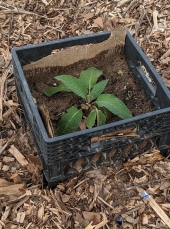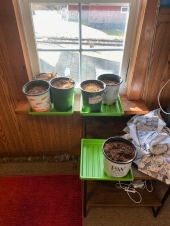


Trace Oswald wrote: I've done it either way, and as far as I can tell, everything works. The way that works best for me if I want new plants as quickly as possible without seeing the old one back as much is to take a spade, put it right in the center, and split the plant. Then I turn the spade 90 degrees and split the two halves. Pull out three quarters of the plant, and plant those three elsewhere. Fill the hole around the original with compost if you have it, or plain soil if you don't.
If I want as many new plants as possible, I pry the whole plant out with a garden fork to get as much of the root system as possible. You won't get it all, so new plants will come up in a number of places in the original spot. Then i chop the plant i yanked out into pieces an inch or two long, and plant each piece of root. I've made 70 or 80 new plants at once this way. I've never counted exactly how many have come up, but definitely more than 95 percent. This spring I can take pictures of a huge ring of comfrey I made in my food forest from one plant.

Monty Loree wrote:
The Problem:
with a few of the comfrey plants they were growing nice leaves. Now the leaves are dying.
I took one of the plants apart to see what was going on. I noticed that the root piece hadn't grown any roots yet.. it was just growing the leaves but no roots..

Mike Barkley wrote:
That's all it takes. another good comfrey thread

Tj Jefferson wrote:In terms of propagating this stuff, the way I do it is to take cuttings, put them in a giant tub of degraded wood chips, jumble them in there so they are mostly covered, pee in the tub, and get the mix damp, like to the point that there's probably some water collecting on the bottom. Then I cover the whole top in saran wrap and put it in the garage where it gets a little light but not much. This makes it a little greenhouse, the condensation drips back down. I remember its out there maybe three weeks later and the whole thing will be going crazy with roots. Then I plant them with no special care at all. Like none, little shovel dig, plant goes in, stomp. I am totally beating these plants up, I split them sometimes twice a year. They don't care at all. Granted I am more interested in geometrically expanding them at this point, I rarely let them flower. They produce the most fantastic soil very quickly and I have the same clay soil Eric is contending with.

Robb Olson wrote:
6: I have one spot along the back of the house where I think I can put the large comfrey plants to get them in the ground, my only hesitation is that we may end up adding 1-2' tall retaining wall (raised bed) there and raising that ground up. If I plant them now at ground level and we then decide we need or want to add the retaining wall, would the comfrey still grow up and through that additional ground?


steve bossie wrote:good to see fresh posts on this thread! i too have planted nettle amongst a patch of comfrey and i now use both for fertilizer around my plants. nettle doesn't produce as much biomass but adds different nutrients than comfrey. i grow a less stinging nettle i bought from Oikios. i also put some cut nettle around the comfrey and comfrey around the nettle. they are both flourishing in a partly sunny spot under my red pines.

Todd Parr wrote:Eric, in the midst of all this, and as much as I hate being the messenger, there is some very bad news. You have been bitten by the insectus comfreisus bug. As far as I can tell, the disease it causes is incurable. I was bitten a few years ago and up to this point, the symptoms have not lessened to any degree. Symptoms are as follows: Insatiable urges to plant comfrey everywhere, incessant chattering on about the plant, constant thoughts of other uses for it, thoughts of taking over the world with comfrey, and planting it on land that is not your own, so that others, so far unafflicted, may soon be caught up in the contagion. It is an insidious disease, but many of us have learned coping mechanisms, not the least of which is complete refusal to listen to anyone that disagrees that comfrey is the one true king of plants, and all ills can be cured by judicious use of it. Best of luck to you.